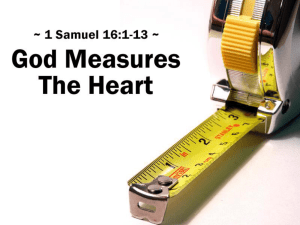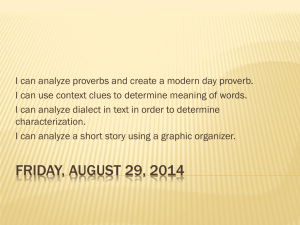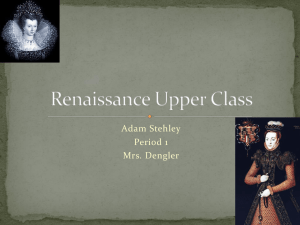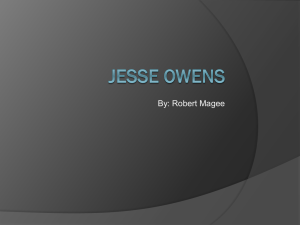Breaking Bad Power Point
advertisement
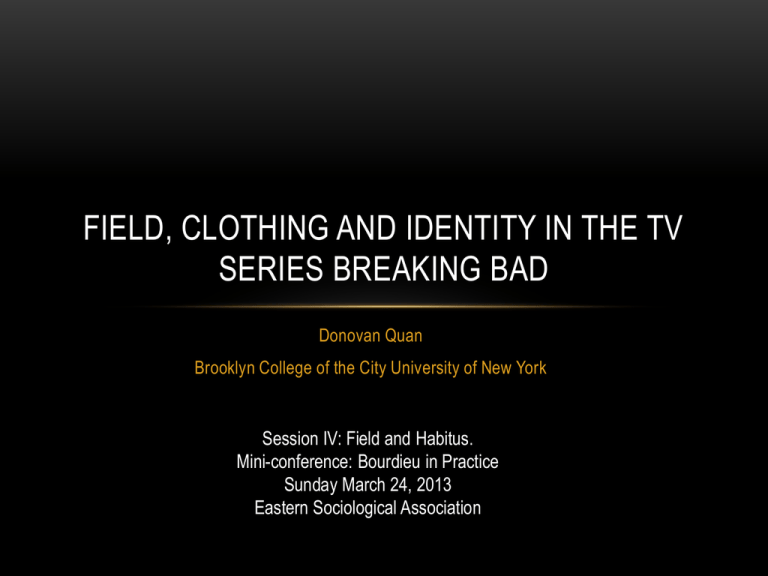
FIELD, CLOTHING AND IDENTITY IN THE TV SERIES BREAKING BAD Donovan Quan Brooklyn College of the City University of New York Session IV: Field and Habitus. Mini-conference: Bourdieu in Practice Sunday March 24, 2013 Eastern Sociological Association THE ROLE OF CLOTHING IN PERFORMING IDENTITY • Gregory Stone (1981: 143) in “Appearance and the Self” speaks of identity being situated, and being an acknowledgement of one’s role and “his participation or membership in social relations.” • Stone explains that the way we present ourselves in front of others changes from one situation to another. • Clothing in a sense is the “mask” we wear to portray a certain perception that we want to convey to other people. • In the popular TV series “Breaking Bad” Mr. White, Jesse Pinkman, Tuco Salamanca and Gus Fring each play very different roles. Choice of clothing defines identity and role for each one of these characters. TUCO, MR. WHITE AND JESSE GUS FRING, OWNER OF LOS POLLOS HERMANOS BOURDIEU HELPS US BETTER UNDERSTAND HOW ROLES AND IDENTITIES ARE SITUATED • Power and status are features of society • However, they must be created and upheld by people • Social norms are diffused to people through “habitus” • Bourdieu defines habitus as the internalization of a cultural arbitrary • It is a process of “inculcation” • Takes the form of a cognitive structure, and a system of values • Perpetuates itself through practices • People reproduce the prevailing norms and they generally fall into their place. JESSE REPRESENTS THE “STREET LEVEL” METH DEALER WHILE GUS IS A DRUG KINGPIN CLOTHING IS A PRACTICE • Clothing it is a form of symbolic capital • It can be seen as cultural capital • Comprise one’s tastes, dispositions and social orientations • Indicates ones economic and social position • Fields are the networks one is implicated in: a middle class neighborhood, a prison, a certain kind of workplace, a country club. • It is within the fields of everyday life that one engages in practices. • In the TV series Breaking Bad we see how moving from one field to another changes a person. This is conveyed in a direct manner through clothing. WALTER WHITE WALTER WHITE • The actor Bryan Cranston, who Walter White is normally dressed as a high school teacher • His outfit consists of chino trousers and a button down dress shirt; what is sometimes is commonly taken to be an academic/teacher style. • This look is consistent with what a high-school chemistry teacher working a second job at the car wash would be able to afford. • When he takes on the persona of his alter-ego “Mr. Heisenberg,” Walter White dons a black fedora (a Pork Pie Hat to be exact), which completely changes the way he presents himself to the other characters in the show. High School Teacher Part- time Drug Maker Drug Lord Drug Kingpin IDENTITY TRANSITIONS ARE EXPRESSED THROUGH MR. WHITE’S CLOTHING STYLE • Walter has also abandoned middle class norms but at first only secretly. • Unlike Jesse who can re-enter a higher social strata than Walter, if he agrees to comply with his parents’ dictates, Walter is at the verge of falling into the lower/working class even though he is highly educated and has all his life subscribed to middle class values. • He is desperately trying to look as if he is still living a middle class life but he is maxed out on his credit and is losing his grip, cancer being the last straw • He holds on to the symbols of a middle class existence: an appropriate job, a higher education, a house in the suburbs, a sensible car, college plans for his children. • As Mr. White moves into the drug world we see a gradual change in his appearance. It is only when he begins to embrace the identity that we see him change his appearance completely. At first all he wants is to use the money to buy his middle class life, so he is motivated not to adopt a new look. JESSE PINKMAN JESSE PINKMAN’S STYLE • Although the character Jesse Pinkman is a couple of years removed from high school, he still dresses as a typical suburban teenager who’s trying to imitate the rappers and gangsters he sees on TV. • Jesse’s wardrobe usually consists of baggy jeans, hoodies with elaborate patterns, windbreakers, and a colorful arrays of t-shirts. • The hip-hop culture clearly has a strong influence in Jesse’s choice of clothing and manner of speech. • The body language and manner in which Jesse presents himself to the viewers and other characters in the show, is that of a drug abuser and someone who didn’t amount to anything in life; even though we, the viewers, later learned that he came from a well off upper middle-class family. EVOLUTION AND CHANGE IN JESSE’S STYLE • Jesse's involvement in the drug world or field at a higher level causes him to adopt a modified appearance. • Jesse adopts the drug dealer look but he is probably at first viewed just as another suburban white kid trying to look dangerous. Eventually he starts to upgrade his look with better brands and a more confident demeanor but always remains within this same field (that is the white suburban drug gangster who may or may not really be dangerous). • When Jesse has a psychological breakdown, and begins using drugs heavily he wears the same clothing but displays a disheveled appearance and a disregard for himself JESSE’S CAR ALSO POSITIONS HIM OUTSIDE OF THE FIELD TO WHICH HE BELONGS JESSE PINKMAN AT THE TOP OF HIS GAME INVERSIONS AND CONTRADICTIONS EXPRESSED THROUGH JESSE’S CLOTHING STYLE • Jesse is an oxymoron, because he’s the smartest dumb person you’ll ever met. • His clothing belies the street-smart and life experience he gains through the years as a crystal-meth cooker and dealer. • Jesse rejects cultural capital. The collegiate path his parents would expect for him is traded for an identification with uneducated African American who would be seen by his community as others or outsiders. • In a more postmodern context it is not so simple. Hip hop artists can be successful entrepreneurs and are in fact embraced by a lot of mainstream society perhaps because their values run counter to mainstream norms. • Middle class suburban youth may rebel again the cultural capital their parents try to pass on to them through an identification with Black Hip Hop culture while at the same time retaining a lot of their white middle class privileges. • In Jesse's case he really has rejected middle class norms and has indeed become a part of the real drug culture that hip hop artists are only pretending to identify with. TUCO SALAMANCA TUCO’S SALAMANCA’S STYLE • Tuco is shown wearing flamboyant silky dress shirts with exotic patterns to go along with his mundane colored dress pants. • Tuco looks like he’s ready for a night out partying along the club-strip of South Beach, Miami. • There’s an underlining meaning behind Tuco’s fashion sense: the writers of the show put forward the sociopathic nature of Tuco through his clothing. • The crazy and wild design pattern on his dress shirts represents his homicidal tendencies, while the mundane dress pant represent his more calm-minded business side. • One minute he’s a calm drug-dealing businessman, the next minute he snaps and kills his own henchman for speaking up for him. • Tuco Salamanca’s clothing is reminiscent of an infamous villain from the Batman’s lore, TwoFace. Except in this case Tuco could be considered the horizontal “Two-Face” where the split between his two personalities occurs right about the waist line, as opposed to evenly down the middle. TUCO’S HABITUS AND FIELD IS CLEAR AND DIRECT • • Tuco is of course different from Walter and Jesse in that he probably came from the lower class in Mexico and he aspired to be what to him appeared powerful and desirable: a drug lord. • Tuco lacks cultural capital. • He is not rebelling against middle class norms. He is an outsider. • He is not embracing a hip hop gangster “look” which emulates this world, he is embracing the real and brutal world of the Mexican drug lord in which he has risen. Tuco traded the miserable existence of the laborer for the chance of rising in the drug world and gaining economic capital. When he wears one or another shirt he wears it proudly. • Tuco shows us that he really feels he has arrived and he is someone at the top of his field. • He is not trying to compete with a preppy or elite world of modest tastes, he is embracing a world where he announces definitely that he is a powerful but corrupt man. GUSAVO “GUS” FRING GUS FRING’S STYLE • Gus Fring has two distinct appearances, one of which is an everyday run-of-the-mill fast food restaurant manager and the other being a savvy calm and collected businessman • His plain appearance at work is similar to Mr. White, consisting of a chino trouser, a button down dress shirt and a tie. He is clearly front line retail management • Even the car that he chosen to drive (a Volvo S70) is practical and inconspicuous. • When he’s engaged with his other business endeavor, which involves high level distribution of crystal meth, he could be seen in an tailored two-piece business suit. • Later in the show we see that he lives in an upscale neighborhood but this income would appear to those around to originate from his restaurant chain and other businesses • Little is known about his social class and how he become involved in the drug world. He came from Chile to Mexico and then to the USA. GUSTAVO “GUS” FRING
